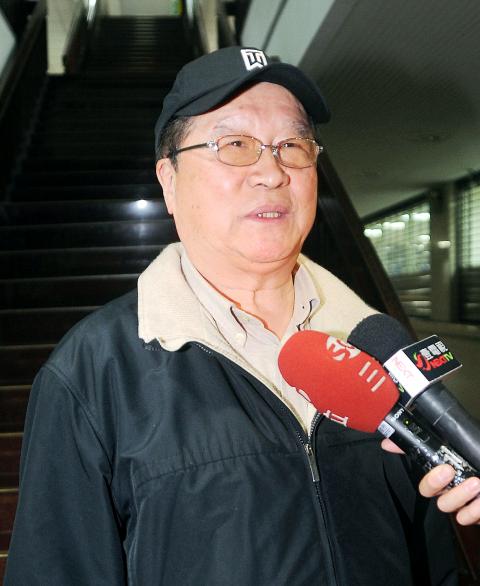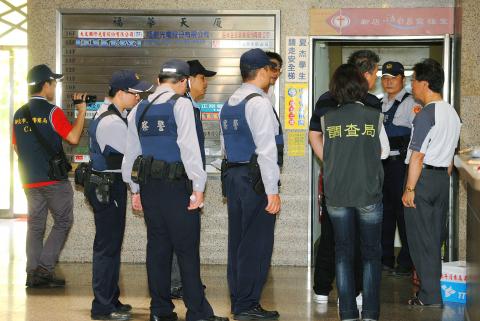Former independent legislator Lo Fu-chu (羅福助) failed to report to the Taipei District Prosecutors’ Office yesterday to begin serving a four-year prison term, the office said, adding that Lo might be placed on the wanted list by last night.
The office said it received a petition from Lo yesterday asking for a reprieve so that he could file an extraordinary appeal and take care of some business matters.
Prosecutors rejected his appeal and issued 22 warrants for his arrest.

Taipei Times file photo
Lo has not been seen in public for nearly a month, despite law enforcement officers’ efforts to track him down.
Prosecutors said they may put him on the wanted list and confiscate his NT$10 million (US$339,000) bond.
The statute of limitations would not run out on Lo’s case until December 2030, when he will be 87, the office said.

Photo: Liao Chen-huei, Taipei Times
Local media reports said Lo might have fled the country after Tomb Sweeping Day on April 4 and could be in either China or Australia, where he has many friends and relatives, or in the US. He is also believed to have invested in a hotel in Shanghai.
Lo, a controversial figure, was imprisoned for more than three years in 1984 for ties to the Celestial Way (天道盟) gang and detained in 2002 for four months for suspected fraud and embezzlement.
He began serving in the legislature in 1996 and was re-elected to another term in 1999, during which he became an independent lawmaker.
On March 28, the Supreme Court sentenced him to four years in prison and fined him NT$6 million for stock manipulation, document forgery and money laundering under the Securities and Exchange Act (證券交易法) and the Business Accounting Act (商業會計法).

MAKING WAVES: China’s maritime militia could become a nontraditional threat in war, clogging up shipping lanes to prevent US or Japanese intervention, a report said About 1,900 Chinese ships flying flags of convenience and fishing vessels that participated in China’s military exercises around Taiwan last month and in January last year have been listed for monitoring, Coast Guard Administration (CGA) Deputy Director-General Hsieh Ching-chin (謝慶欽) said yesterday. Following amendments to the Commercial Port Act (商港法) and the Law of Ships (船舶法) last month, the CGA can designate possible berthing areas or deny ports of call for vessels suspected of loitering around areas where undersea cables can be accessed, Oceans Affairs Council Minister Kuan Bi-ling (管碧玲) said. The list of suspected ships, originally 300, had risen to about

DAREDEVIL: Honnold said it had always been a dream of his to climb Taipei 101, while a Netflix producer said the skyscraper was ‘a real icon of this country’ US climber Alex Honnold yesterday took on Taiwan’s tallest building, becoming the first person to scale Taipei 101 without a rope, harness or safety net. Hundreds of spectators gathered at the base of the 101-story skyscraper to watch Honnold, 40, embark on his daredevil feat, which was also broadcast live on Netflix. Dressed in a red T-shirt and yellow custom-made climbing shoes, Honnold swiftly moved up the southeast face of the glass and steel building. At one point, he stepped onto a platform midway up to wave down at fans and onlookers who were taking photos. People watching from inside

Japan’s strategic alliance with the US would collapse if Tokyo were to turn away from a conflict in Taiwan, Japanese Prime Minister Sanae Takaichi said yesterday, but distanced herself from previous comments that suggested a possible military response in such an event. Takaichi expressed her latest views on a nationally broadcast TV program late on Monday, where an opposition party leader criticized her for igniting tensions with China with the earlier remarks. Ties between Japan and China have sunk to the worst level in years after Takaichi said in November that a hypothetical Chinese attack on Taiwan could bring about a Japanese

The WHO ignored early COVID-19 warnings from Taiwan, US Deputy Secretary of Health and Human Services Jim O’Neill said on Friday, as part of justification for Washington withdrawing from the global health body. US Secretary of State Marco Rubio on Thursday said that the US was pulling out of the UN agency, as it failed to fulfill its responsibilities during the COVID-19 pandemic. The WHO “ignored early COVID warnings from Taiwan in 2019 by pretending Taiwan did not exist, O’Neill wrote on X on Friday, Taiwan time. “It ignored rigorous science and promoted lockdowns.” The US will “continue international coordination on infectious